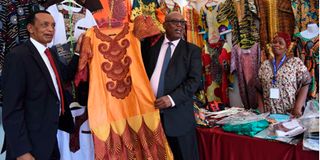State urged to pay attention to the plight of SMEs

Nation Media Group CEO Stephen Gitagama (centre) with Kenya Industrial Estates MD Parmain ole Narikae and Opulent Fashions director Florence Achieng’ at the start of the third edition of the SMEs Conference and Expo in Nairobi on March 24, 2022.
What you need to know:
- Third SMEs expo in Nairobi brings together exhibitors, potential customers and regulators.
- The first such expo was held in 2020 and attracted 6,000 participants and 91 exhibitors.
Small and medium enterprises should be made more competitive for the country to start benefiting from the Sh250 trillion African Continental Free Trade Area (AfCFTA).
This was one of the key messages during the third edition of the Nation Media Group SME Expo at KICC, held jointly with the Ministry of Industrialisation Trade and Enterprise Development, Micro and Small Enterprise Authority (MSEA) and the Kenya National Chamber of Commerce and Industry (KNCCI).
The three-day event, which began yesterday and will run up to March 26, featured exhibitors, policymakers, parastatal heads, business leaders, entrepreneurs, innovators and researchers, among others.
Industrialisation Chief Administrative Secretary David Osiany said that while the level of skill among Kenya’s entrepreneurs cannot be questioned, a lack of standards and consistency in their products has hindered them from accessing larger markets.
“Some doors made in Lamu cost up to Sh1 million in Nairobi. So the talent we have is extreme, but we are not competitive in our standards. And until we fix this, we will just be hearing about markets such as AfCFTA, reading about them in papers and wondering why we are not benefiting from them,” he said.
Mr Osiany said the government is working on addressing the high costs of hyper-regulation, which are hindering the start and growth of businesses. Close to 80 per cent of SMEs in Kenya are unlicensed with the main hindrance being the high cost of compliance.
“We need to address competitiveness of SMEs. Unlicensed and unregistered businesses cannot access credit facilities, investment or service bulk orders and this cripples their business,” said Mr Osiany, who commended NMG for initiatives it has undertaken to support the SME sector, including the annual SMEs expo.
The first such expo was held in 2020 and attracted 6,000 participants and 91 exhibitors. The second, whose theme was SME resilience, recovery and sustainability, at the peak of Covid19, attracted 10,000 participants and 120 exhibitors.
“It is not every day that we afford to give hours on end to SMEs to showcase what they are doing and speak to the nation. The government is delighted to be associated with the Nation Media Group for one reason, that they have taken up the SME burden,” said Mr Osiany.

NMG’s Chief Executive Officer Stephen Gitagama called on consumers to support local entrepreneurs and purchase locally made goods.
“Most of us have a different attitude when we are shopping in the supermarket from when we are shopping from other markets like Gikomba. When you buy a sofa in the supermarket for instance, you pay upfront without bargaining, but in the streets you bargain even when at times the quality in the streets is better and so is the price,” noted Mr Gitagama.
SMEs are a major contributor to the creation of jobs and to Kenya’s GDP. Given their importance and level of contribution to the economy, Mr Gitagama pointed out the need for establishment of tailor-made products to ensure SMEs’ concerns are properly handled.
He suggested the establishment of a ministry that deals specifically with SMEs. He also suggested establishment of a division at the Kenya Revenue Authority (KRA) to cater to the enterprises.
“It goes without saying that the SME sector controls this economy. In December 2020, there were 915 active SME loan accounts valued at Sh638 billion by the CBK (Central Bank of Kenya). Deposits held by SMEs amounted to Sh577 billion,” noted Mr Gitagama. “This was 40 per cent of total money in commercial banks held by SMEs and I am sure this could be much more,” he added.
Kenya National Federation of Jua Kali Associations boss Richard Muteti commended the deliberate and positive government action to support SMEs as reflected in the numerous initiatives to promote their competitiveness. These, he said, include raising duty on finished goods and periodic bans on furniture importation. He, however, pointed out the need for these initiatives to be implemented.
“As a sector, we do not want to be that group of people that are looked down upon yet we are carrying the responsibility of this country on our shoulders. The government says that 30 per cent of all public procurement should go to the SME sector. If that is the case, let it be 30 per cent that is trackable,” said Mr.Muteti.
He pointed out the need to simplify the process of registering a business so that SMEs can formalise their business, enabling them to access more resources and markets. Mr Muteti also urged SMEs to join the available lobby groups to make it easier for them to have their concerns voiced to relevant authorities and benefit from available opportunities.
SMEs were also urged to leverage digital platforms to develop their competitiveness.





